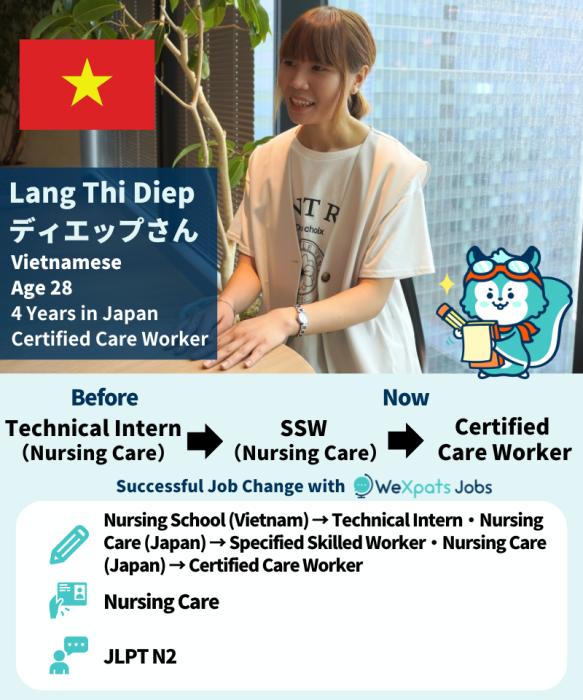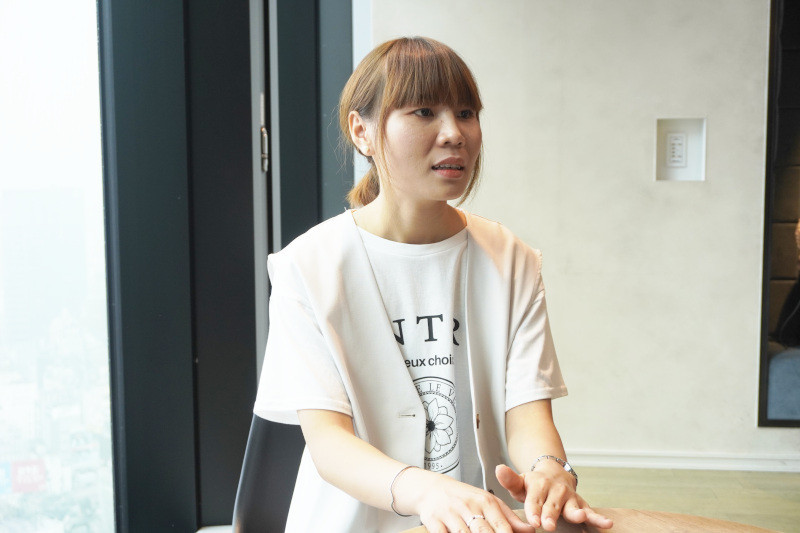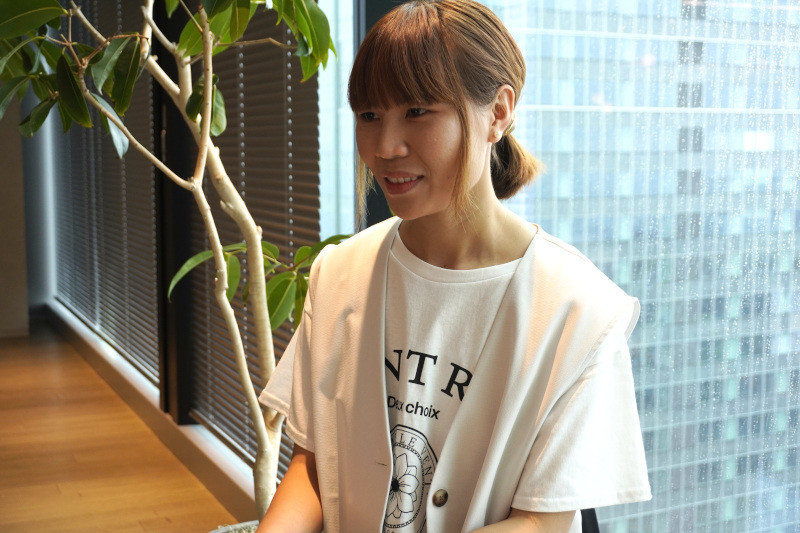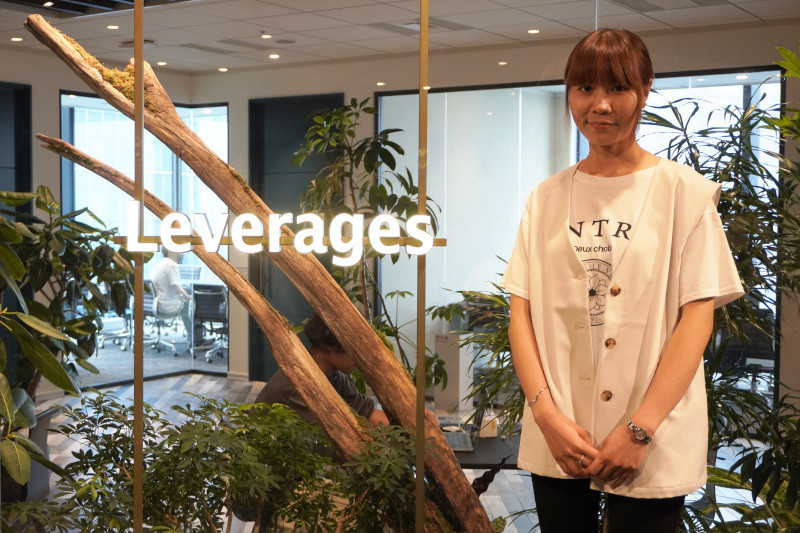There are 3 types of visa for working in the nursing care industry in Japan. The “Technical Intern Training” visa, the “Specified Skilled Worker” Visa, and the “Nursing Care (介護, Kaigo)” visa which is only available to those who are qualified as certified care workers.
Among these, the most difficult visa type to obtain is the “Nursing Care” visa. While this visa allows one to work in Japan indefinitely (unlimited renewals), in order to take the prerequisite certification exam to become a certified care worker, you must either have graduated from a Japanese vocational school, or have 3 years of working experience in the field to qualify.

Ms. Lang Thi Diep from Vietnam came to Japan in 2019 on a “Technical Intern Training” visa, then switched to a “Specified Skilled Worker” visa for reemployment, and has now passed the qualification exam to obtain a “Nursing Care” visa.
It goes without saying that Ms. Diep’s unwavering hard work was behind these achievements. Even so, Ms. Diep herself says, “I was able to pass the exam thanks to the support of my colleagues”.
We asked Ms. Diep how she encountered such a wonderful workplace, and why she decided to take on the challenge of such a difficult exam.
 Are you having any issues with job-hunting in Japan?
Are you having any issues with job-hunting in Japan?
Wanting to Learn the Various Types of Caregiving in Japan
―― Congratulations on passing the Certified Care Worker examination. Since you took the exam immediately after completing the required 3 years work experience, that means you made it pass the fastest route.

Thank you. I’m relieved to have passed.
―― Ms. Diep, you are currently working as a caregiver in Yokohama, Japan. Could you tell us about your career up to this point?
Yes. I graduated from a nursing school in Vietnam, then continued on to study at a Japanese language school in VIetnam and obtained the JLPT, and then came to Japan in 2019 on a technical intern visa. As soon as my technical intern period ended, I switched to a specified skilled worker visa and started working at a different place.
The first place I lived in in Japan was Sapporo City on the island of Hokkaido. Sapporo is one of Japan’s larger cities and a convenient place to live, but there was one thing that bothered me. It was extremely cold!
―― That’s because Hokkaido is the snowiest region in Japan.
Exactly. It was certainly beautiful to see snow for the first time, but it was so cold that I didn’t have much time to be impressed, and the roads were buried under snow 10s of centimetres high. The facility where I worked at was a great place to work, but as soon as my technical intern training ended, I moved to Yokohama as if I was running away (laughs)
But, it (Hokkaido) was cool and comfortable even in summer, so I think it’s a perfect place for people who don’t like the heat.
―― Hokkaido is certainly a tough place to live if you don’t like the cold. Why did you decide to work in Japan, Diep-san?
When I was a student, a friend who studied abroad in Japan shared with me that it was a great place. Vietnam is also facing population ageing, and since I was deeply interested in caregiving work, which is expected to be in demand in the future, I thought it would be a good idea to experience state of the art facilities in Japan.
Also, I wanted to take on the challenge of studying Japanese, which is said to be difficult to master.
―― What do you think after experiencing Japan firsthand?

When I first came to Japan, I was focused on learning Japanese more than work. I had studied Japanese hard in Vietnam, so I had confidence that I could communicate to a certain extent, but there were also many situations where what I had studied did not help…
For example, when asked “Has A gone home?”. I could understand the meaning of “go home”, but I would reply “going home”, which is grammatically incorrect. It was difficult to understand the nuances, and to convey them correctly.
[Reference] Here’s an explanation to help you understand the Japanese.
“Has A gone home?”
“Aさんは帰りましたか? (A-san wa kaerimashitaka?)”Diep-san answered:
“Going home.”
“帰ります。 (Kaerimasu.)”The correct answer should be:
“[A has] gone home.”
“帰りました。(Kaerimashita.)”
However, my previous workplace offered Japanese language classes, so I gradually became able to speak better.
―― Why did you choose to stay in Japan after your technical intern training ended?
My previous workplace was a facility where mainly elderly with dementia live. There are many types of nursing care facilities in Japan, and the symptoms of people living there are different, so I wanted to learn about nursing care for cases other than dementia.
People with dementia forget easily, and some cannot control their emotions well. Generally they can do basic daily activities by themselves, if anything, most cases require care when it comes to communication.
On the other hand, my current workplace is home to elderly who have trouble moving their bodies properly. They face difficulties eating and excreting by themselves, and so require help with doing most things. It may be similar to the medical field.
An important common point between both places is the awareness of respecting the dignity of users. People who can no longer move their bodies, and can no longer shower or excrete by themselves, are very mentally distressed. Therefore, it is not enough to just wash their bodies, you need to communicate with them and be considerate of their feelings when providing care.
Even after my technical intern training ended, I wanted to continue working in various types of nursing care, and learn many things.
―― So that’s why you became qualified as a certified care worker. When did you start studying?
During the gap period between the end of my contract with my previous job, and the start of my current job. I was busy with moving and other procedures, but Leverages Global Support (LGS)* helped me. I had a job lined up, so I could study with no worries.
*Leverages Global Support (LGS) is an employment service run by us for people who want to work with specified skills. In addition to job introductions, you can receive various support such as for changing your status of residence (visa type), finding a place to stay, and interview preparations, all for free.
Writer's Pick
Assistance from a Career Advisor with Reemployment after Changing from Technical Intern to Specified Skilled Worker
―― Thank you. Why did you decide to use LGS?
I was introduced to LGS when I was looking for job information on Facebook. As soon as I registered, I started receiving support via LINE.
At first, I was worried whether it was a trustworthy service. But they taught me everything I didn’t understand, and also advised me, “Let’s learn how to do things yourself in order to live in Japan for a long time.”
I had personally made a resolution to myself, “to be able to live on my own strengths after my technical intern training period is over”, so I was very grateful for LGS’s way of supporting me while encouraging me to be independent. I felt that this service really cared and thought about what’s best for me.
―― From then, how did you get a job?
Through LINE, the career advisor asked me what I wanted, so I answered, “I want to send money to my family, so a high salary would be better”, and “I want to work at a different type of nursing care facility than before.” Oh, I also said, “Preferably somewhere that’s not cold.” (laughs)
Then, they sent me a few choices, and my current workplace was one of them. They helped me with interview preparations and etc., and I was able to get a job.
One thing I’m most grateful for is the continued support with procedures even after I got the job. They taught me to get documents from the town hall before moving. If I had moved without knowing, I would have had to travel very far to get the documents.
―― I’m glad our service was helpful! How do you find your current workplace?
It’s a great place to work. There are 5 Vietnamese, 4 Nepalese, and 5 Cambodians, so there’s a lot of support from foreign nationals. Also, everyone, including the Japanese, are young, so it’s easy to talk to them. We sometimes hang out together when our day offs coincide.
There are a lot of people working there, and there’s always someone in charge at the workplace, so it’s reassuring to know that you can consult with someone immediately if you have any problems.
I have also come to like Yokohama City, where my workplace is located. I was interested in Yokohama before because it is a place that often appears in Japanese textbooks. There are many beautiful parks for enjoying walks, and there are many tourist spots such as Chinatown.
―― Was it difficult to study for the qualification while working?
Of course it was hard to find time to study, but I think I was able to pass thanks to the support of my coworkers. If there was something I didn’t understand I could ask my seniors, and there were some questions I was able to understand because of the experience I received from my current workplace.
When I passed, everyone at work was happy for me. And I got a raise too.
―― Do you have any advice for those who are studying to become Certified Care Workers?
You really just have to keep solving the questions over and over again. I think the hardest part of the exam for foreign nationals is the Japanese language. Read the question sets over and over again to get used to the unique expressions used in the exam!
―― Lastly, please share with us your future goals.

Now that I’ve passed the exam, which was my previous goal, I’m taking it easy. But once things have settled down, I’d like to resume studying Japanese.
My current goal is to get a medical interpreter qualification. Recently, more and more Vietnamese are visiting Japan for medical treatment. I’d be happy if my work can help people from my home country while learning various things in Japan.
Ever since I was a child, I’ve wanted to get a job that helps people. I want to make my dream come true in various ways, not just in nursing care.
What is Leverages Global Support?

Leverages Global Support is a career support service that introduces jobs that require specific skills to specified skilled workers.
We also help with all the procedures required for employment and job changes, such as change of status of residence (visa type) and interview practice. If you have any problems after starting work, please feel free to contact us as well.
If you would like to know more about specified skilled workers and specific skills, please read this article, or contact a career advisor.
Recommended For
- Specified Skilled Workers who are thinking about changing jobs
- Technical Interns who want to switch to becoming a Specified Skilled Worker (You can try working in a new industry even with no experience!)
- International Students who have graduated from a Japanese school but are having trouble finding a job
How to Use Leverages Global Support
Ask for Job Recommendations
A career advisor will support you with your job search based on your desires. If you would like to be introduced to a specific skill job, feel free to send us a message using the link below.
Mention “WeXpatsを見た” at the beginning of your message, and our staff will respond promptly.
※ A Facebook account is required. Responses will be in Japanese.
Browse Jobs Yourself
You can search for the perfect job by specifying your Japanese level, occupation, work location, etc. We have many jobs available not only for Specified Skilled Workers, but also for Engineer / Specialist in Humanities / International Services.
※ You can register from outside Japan, but only those living in Japan can apply for jobs.



































